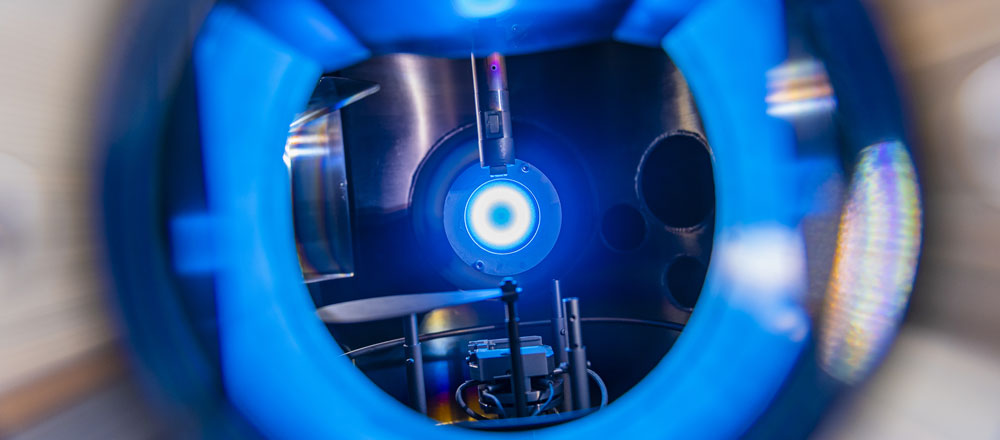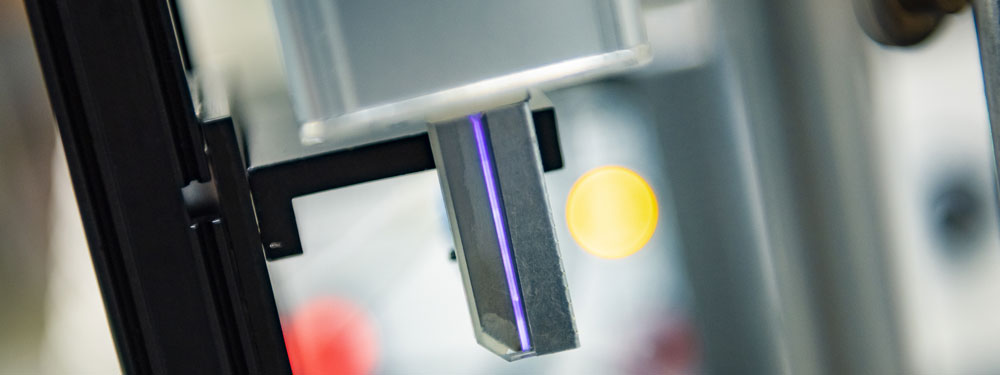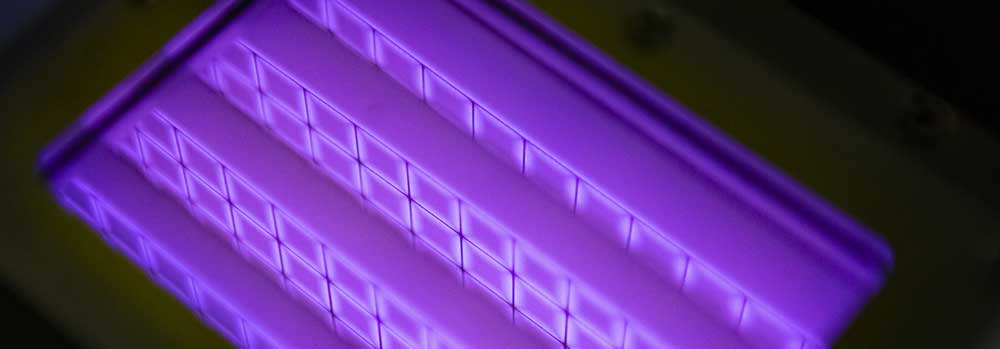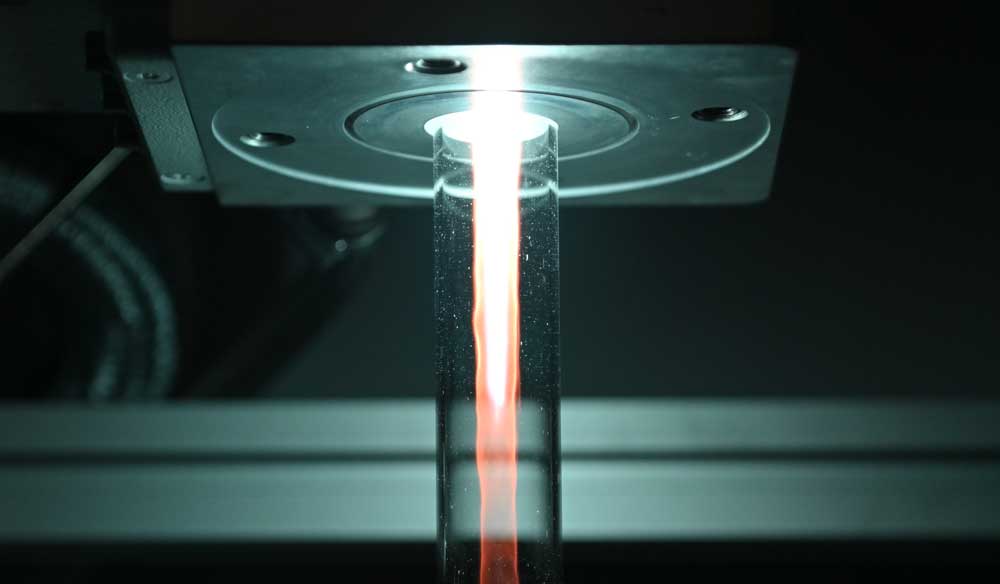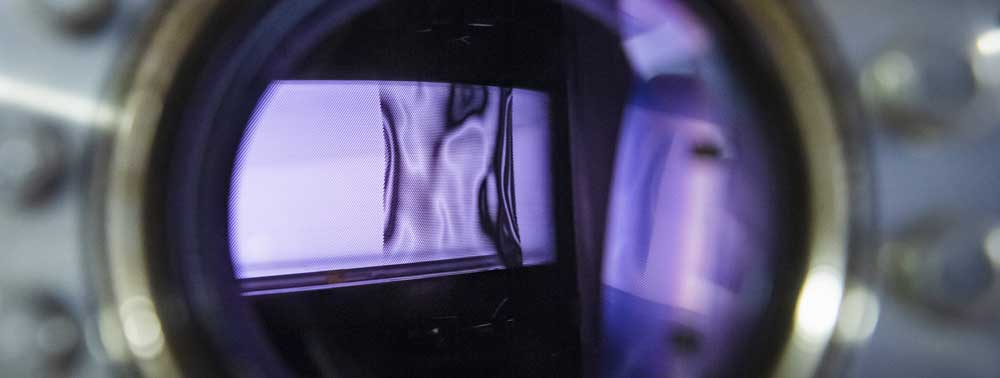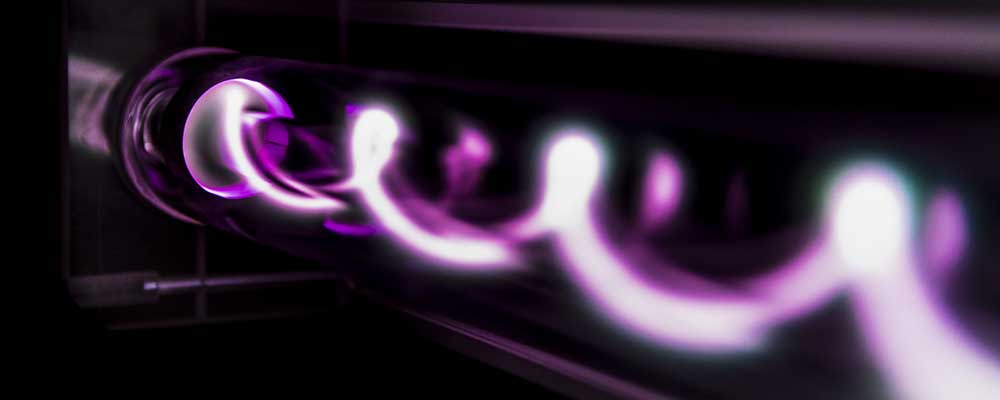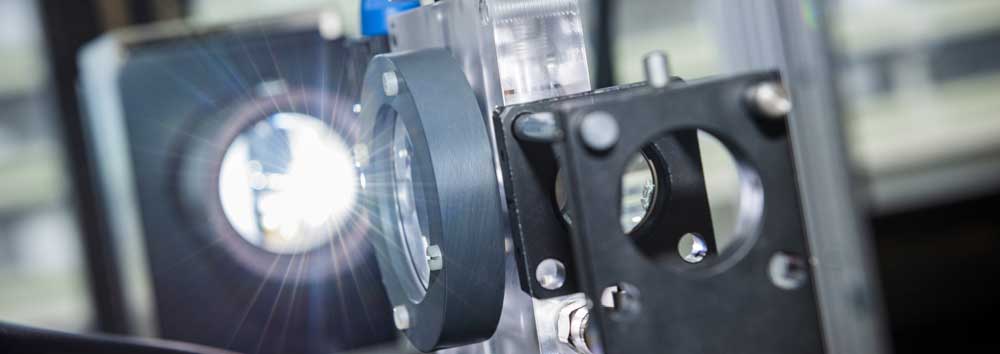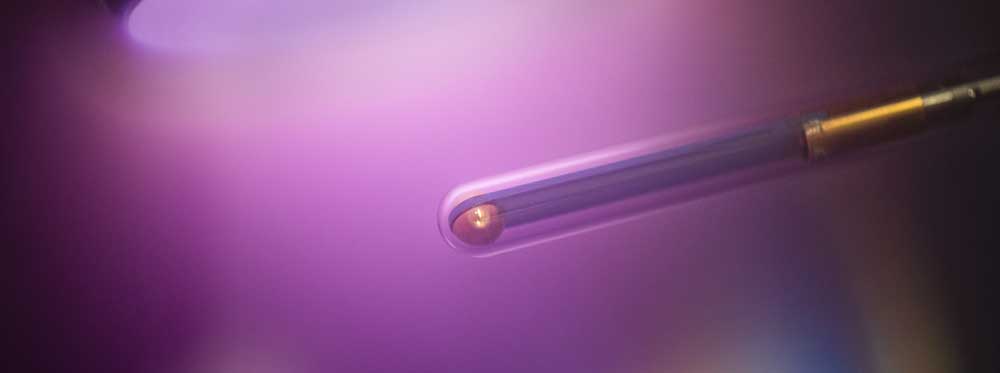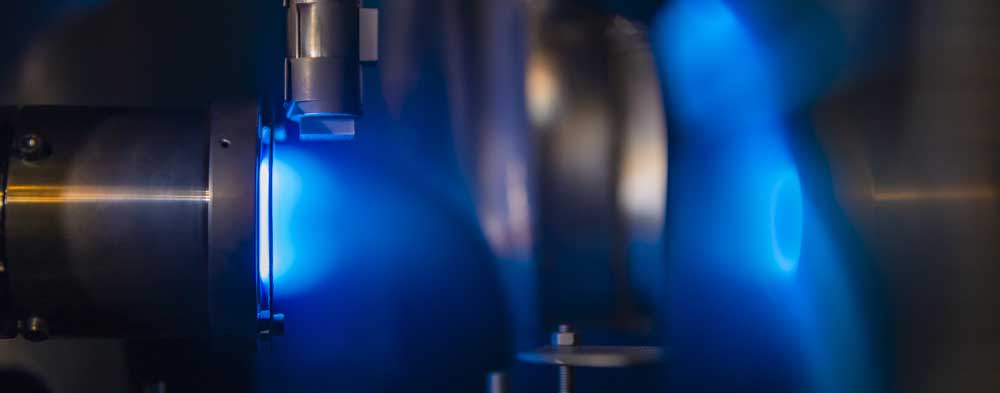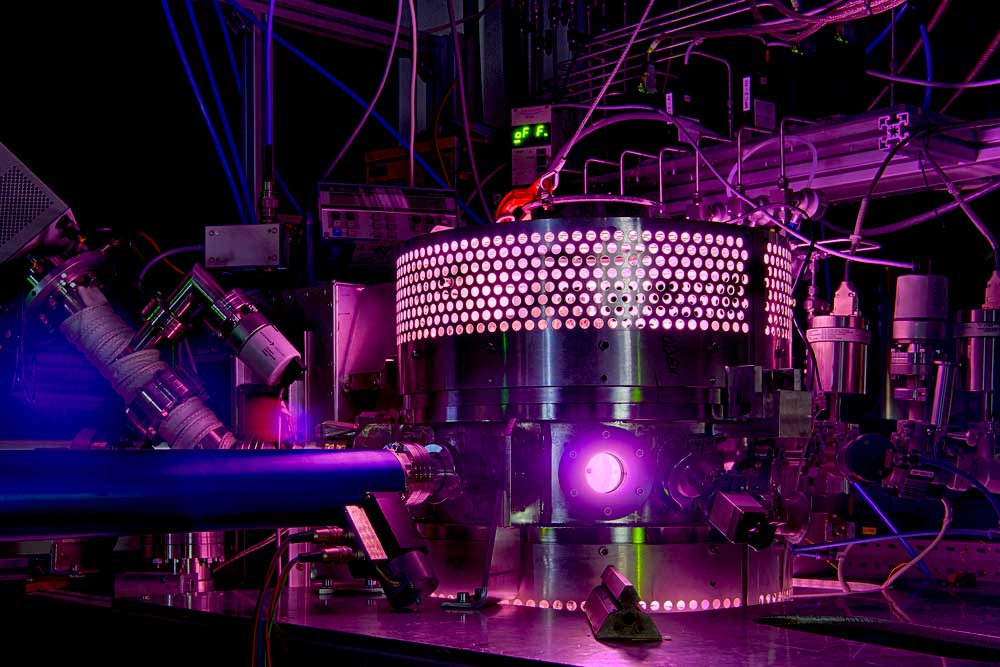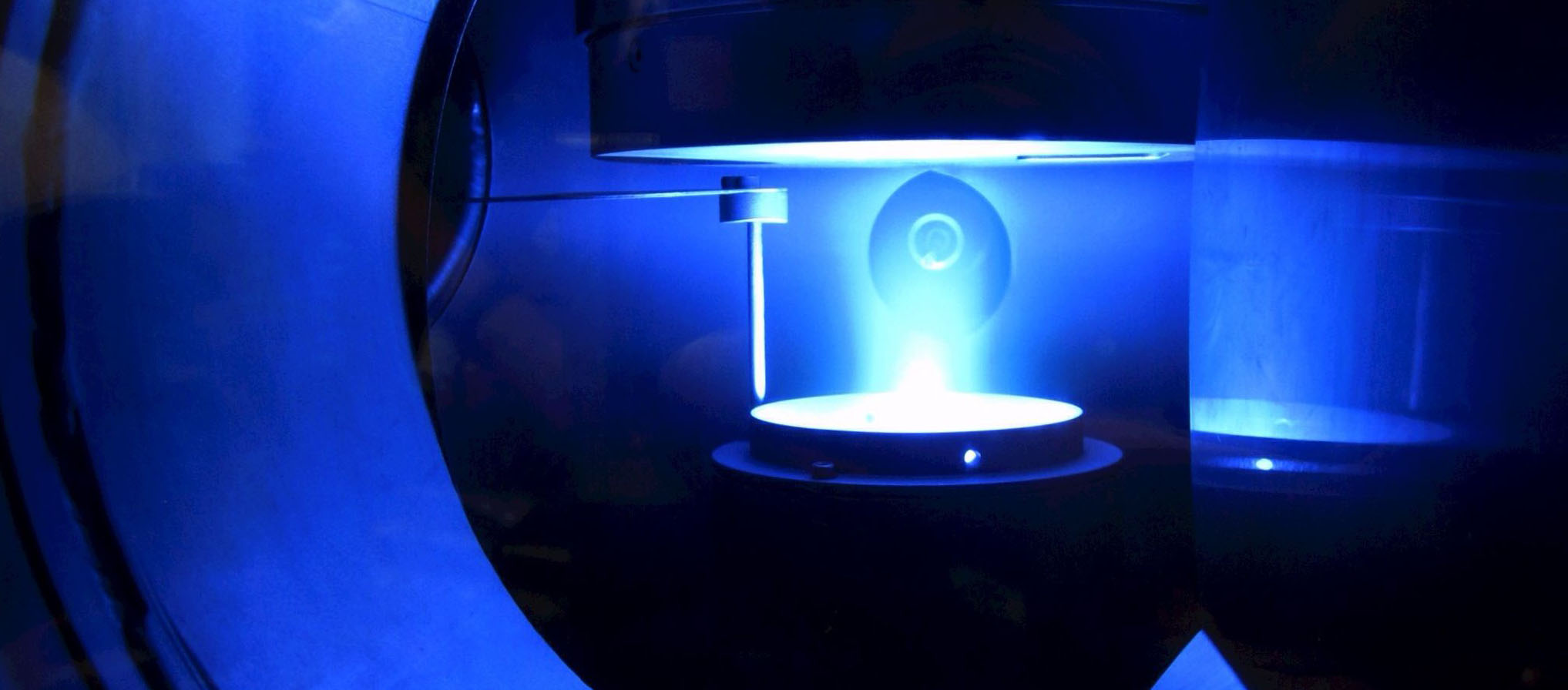B5 - Plasma in liquidsBubble dynamicsGas bubble dynamics during Plasma Electrolytic Oxidation |
- Details
Workshop
Unconscious Bias
 On Tuesday, March 4, 2025, members of the SFB 1316 participated in a workshop on the topic of Unconscious Bias led by Dr. Juliane Handschuh. The workshop's objective was to understand the impact of prejudices in scientific research and general work environments and learn to recognize unconscious biases in oneself and in the workplace. After Dr. Handschuh gave an introductory talk on the topic, the group was divided into groups of Early Career Researchers (ECRs) and Principal Investigators (PIs) to encourage an open exchange. In preparation for the workshop, participants had been encouraged to anonymously submit personal incidents where they experienced a bias. The group exercises were used as case studies and foundation for discussion. Together, strategies to recognize and adequately approach unconscious biases were developed as a directly affected person and as a bystander. At the end of the workshop, both groups joined again for a final discussion. The workshop provided valuable insights into the complex topic of unconscious biases and has provided the members of the SFB with practical tools to foster a more inclusive research environment.
On Tuesday, March 4, 2025, members of the SFB 1316 participated in a workshop on the topic of Unconscious Bias led by Dr. Juliane Handschuh. The workshop's objective was to understand the impact of prejudices in scientific research and general work environments and learn to recognize unconscious biases in oneself and in the workplace. After Dr. Handschuh gave an introductory talk on the topic, the group was divided into groups of Early Career Researchers (ECRs) and Principal Investigators (PIs) to encourage an open exchange. In preparation for the workshop, participants had been encouraged to anonymously submit personal incidents where they experienced a bias. The group exercises were used as case studies and foundation for discussion. Together, strategies to recognize and adequately approach unconscious biases were developed as a directly affected person and as a bystander. At the end of the workshop, both groups joined again for a final discussion. The workshop provided valuable insights into the complex topic of unconscious biases and has provided the members of the SFB with practical tools to foster a more inclusive research environment.
- Details
Meeting
CRC Fall Meetings
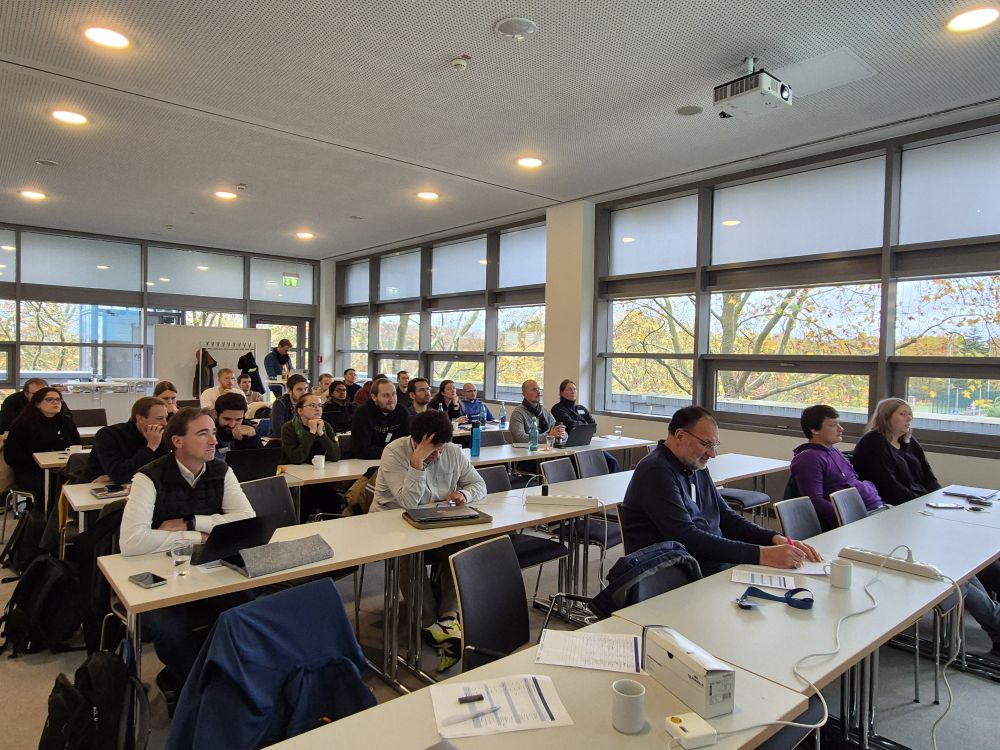 This year's fall meeting covered the progress within the individual projects of the SFB to identify common challenges and common ideas for the future. This year's fall meeting was complemented by a training workshop on commercial plasma simulation tools
This year's fall meeting covered the progress within the individual projects of the SFB to identify common challenges and common ideas for the future. This year's fall meeting was complemented by a training workshop on commercial plasma simulation tools
- Details
Conference
Two PhD Students at Hakone conference
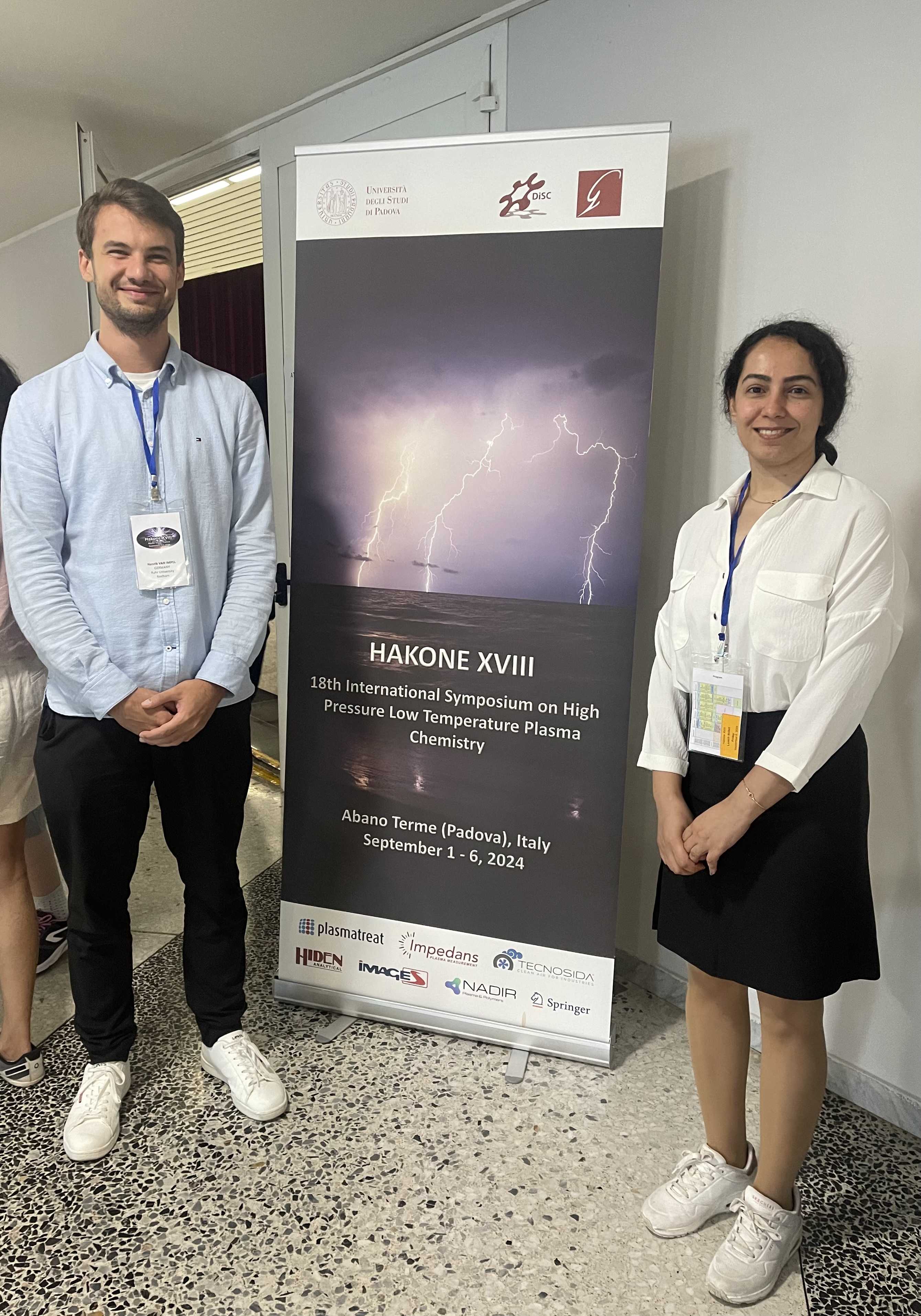 Soad Mohsenimehr and Henrik van Impel (A6) gave presentations on their latest research at the 18th Hakone Conference, which took place in Padua, Italy, from September 1st to 6th, 2024. The event featured numerous insightful presentations dealing with low-temperature plasmas at atmospheric pressure and their applications in plasma chemical processes. One of the highlights of the conference was the active participation of students: 22 of the 56 presentations were given by PhD students, which created a very appealing environment for young researchers. In particular, dielectric barrier discharges were discussed in terms of their efficiency when used with catalysts and the basic physical dynamics of the discharges. Other topics included plasma applications in agriculture and food processing as well as the interaction between plasma and liquid. In addition to the scientific findings, the conference provided an excellent platform for PhD students to network with international participants from 24 countries, promoting collaboration between disciplines.
Soad Mohsenimehr and Henrik van Impel (A6) gave presentations on their latest research at the 18th Hakone Conference, which took place in Padua, Italy, from September 1st to 6th, 2024. The event featured numerous insightful presentations dealing with low-temperature plasmas at atmospheric pressure and their applications in plasma chemical processes. One of the highlights of the conference was the active participation of students: 22 of the 56 presentations were given by PhD students, which created a very appealing environment for young researchers. In particular, dielectric barrier discharges were discussed in terms of their efficiency when used with catalysts and the basic physical dynamics of the discharges. Other topics included plasma applications in agriculture and food processing as well as the interaction between plasma and liquid. In addition to the scientific findings, the conference provided an excellent platform for PhD students to network with international participants from 24 countries, promoting collaboration between disciplines.
- Details
Workshop
Japanese-German Workshop on Low-Temperature Plasma Application
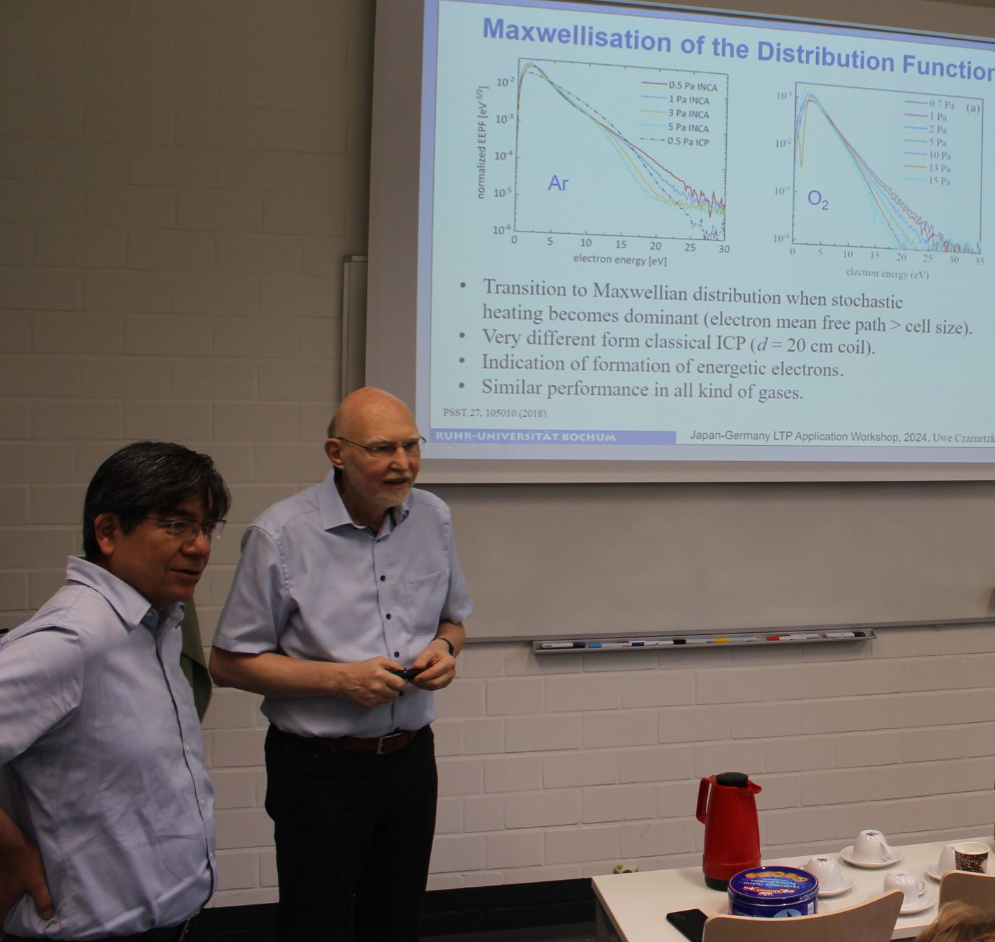 A workshop with guests from Japanese universities/ research institutions and members of the chair of Experimental Physics V was held on 25th and 26th of July. Initiated by Prof. Aramaki from Nihon University, the workshop brought together long time collegues who stayed as collaborators at EP V during the last 20 years. All of them conduct research in the field of low temperature plasmas. This covers a broad range from the application for agriculture or semiconductor fabrication as well as developing new kinds of diagnostics like vortex laser spectroscopy. With these topics a perfect overlap with the research of the CRC is given so that the workshop consists not only of one day of presentations but also one day of laboratory visits allowing for the guests to get an overview of the current local plasma research.
A workshop with guests from Japanese universities/ research institutions and members of the chair of Experimental Physics V was held on 25th and 26th of July. Initiated by Prof. Aramaki from Nihon University, the workshop brought together long time collegues who stayed as collaborators at EP V during the last 20 years. All of them conduct research in the field of low temperature plasmas. This covers a broad range from the application for agriculture or semiconductor fabrication as well as developing new kinds of diagnostics like vortex laser spectroscopy. With these topics a perfect overlap with the research of the CRC is given so that the workshop consists not only of one day of presentations but also one day of laboratory visits allowing for the guests to get an overview of the current local plasma research.
- Details
Conference
Five Posters at ESCAMPIG
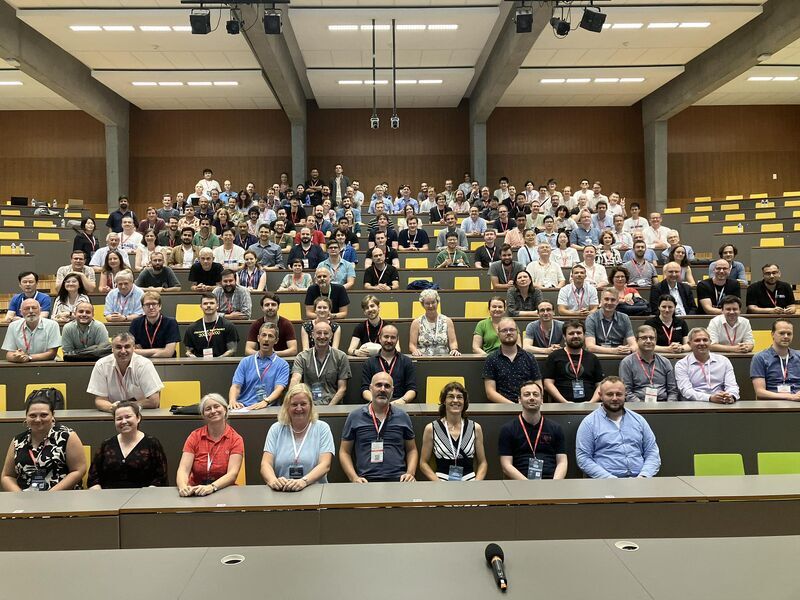 This year's ESCAMPIG conference took place in Brno, Czech Republic. Three members of Experimental Physics II and one member of AEPT from Bochum took part and contributed to the conference with five posters. In addition to the interesting plenary lectures by well-known personalities such as Peter Bruggeman (USA), Luís L. Alves (Portugal), Kinga Kutasi (Hungary) and Holger Kersten (Germany), there was a variety of around 160 other posters on both modelling and experimental topics. In addition to the professional exchange, the conference offered excellent evening events, such as the welcome party with a dance class and Czech specialities or the conference dinner with live music and a cosy atmosphere. We had many interesting discussions at the conference and met new and old acquaintances, which is why we came away from the conference with very positive experiences overall.
This year's ESCAMPIG conference took place in Brno, Czech Republic. Three members of Experimental Physics II and one member of AEPT from Bochum took part and contributed to the conference with five posters. In addition to the interesting plenary lectures by well-known personalities such as Peter Bruggeman (USA), Luís L. Alves (Portugal), Kinga Kutasi (Hungary) and Holger Kersten (Germany), there was a variety of around 160 other posters on both modelling and experimental topics. In addition to the professional exchange, the conference offered excellent evening events, such as the welcome party with a dance class and Czech specialities or the conference dinner with live music and a cosy atmosphere. We had many interesting discussions at the conference and met new and old acquaintances, which is why we came away from the conference with very positive experiences overall.
- Details
Conference
ISPCEM Success: Prize Awarded to Steijn Vervloedt
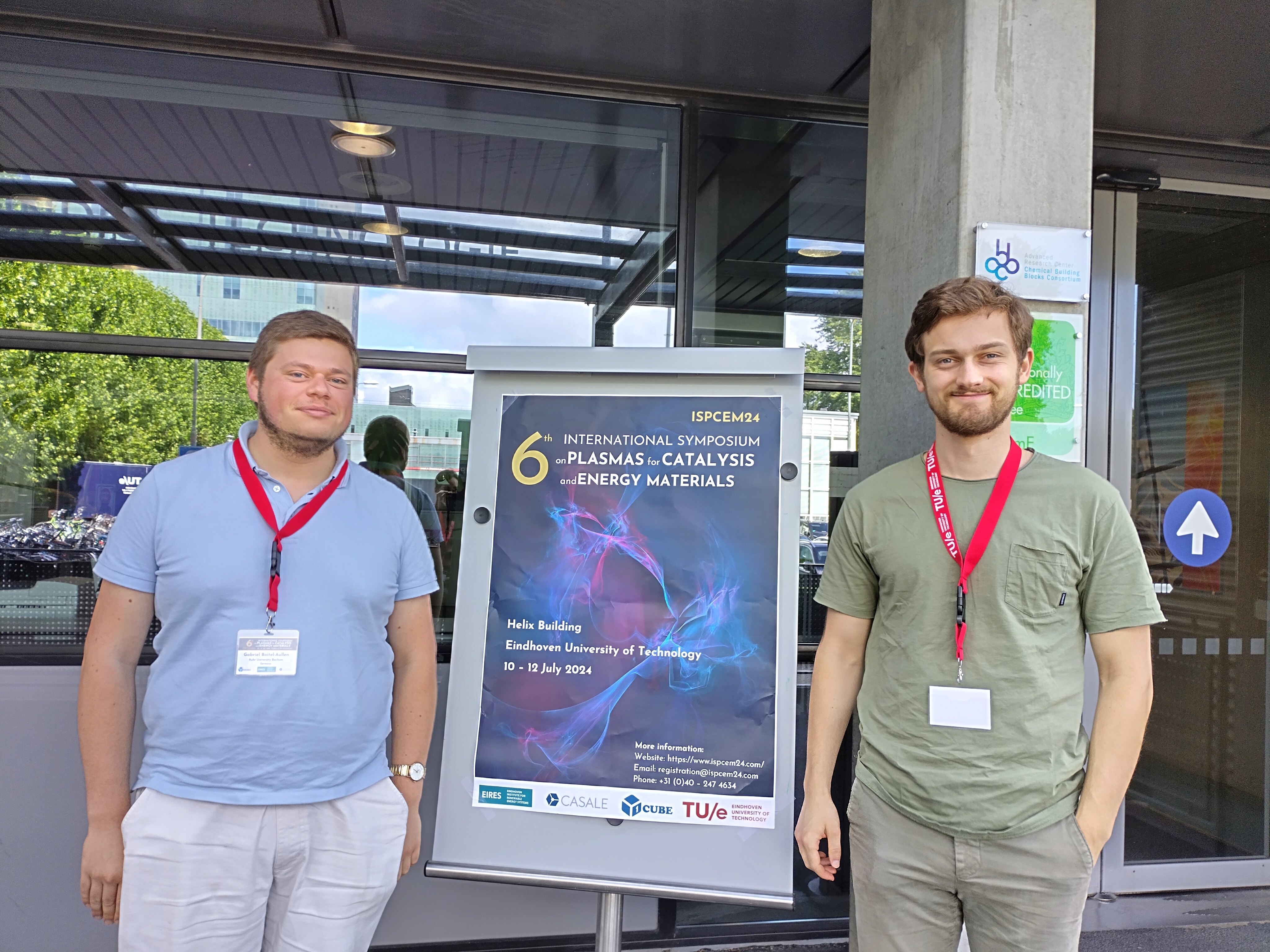 Gabriel Boitel-Aullen (project B13) and Steijn Vervloedt (project A3) took part in the 6th International Symposium on Plasmas for Catalysis and Energy Materials (ISPCEM) in Eindhoven, from 10th to 12th of July. During the two-and-a-half-day event, presentations were given on the latest advances in plasma catalysis, ranging from nitrogen fixation to the dissociation of CO2 and the formation of hydrocarbons. Gabriels and Steijns plasma catalysis measurements are usually done with DBD’s, highlighting the ease of installing and operating such discharges. Also, a few presentations on the plasma-assisted synthesis of catalysts, which is the topic of project B13. Our researchers were allowed to orally present the recent developments of their projects, where Steijn was awarded with the best oral presentation.
Gabriel Boitel-Aullen (project B13) and Steijn Vervloedt (project A3) took part in the 6th International Symposium on Plasmas for Catalysis and Energy Materials (ISPCEM) in Eindhoven, from 10th to 12th of July. During the two-and-a-half-day event, presentations were given on the latest advances in plasma catalysis, ranging from nitrogen fixation to the dissociation of CO2 and the formation of hydrocarbons. Gabriels and Steijns plasma catalysis measurements are usually done with DBD’s, highlighting the ease of installing and operating such discharges. Also, a few presentations on the plasma-assisted synthesis of catalysts, which is the topic of project B13. Our researchers were allowed to orally present the recent developments of their projects, where Steijn was awarded with the best oral presentation.
- Details
DFG
CRC 1316 is part of the annual report 2023 of the German Science Foundation
The research of CRC1316 is highlighted in the German Science Foundation's annual report. Under the title "Electrifying with Plasmas," the various conversion strategies are explained and illustrated based on the CRC's individual projects.
- Details
Meeting
General Assembly in Hamminkeln

From July 1 to 3, 2024 the CRC 1316 Summer Meeting has been held in Hamminkeln-Dingden. Over 50 members of the CRC 1316 came together to discuss recent activities and start the planning for the future activities. The meeting place was perfect to interact with each other also beside the sessions to deepen cooperations or get to know new members of the consortium.
- Details
Workshop
15th workshop on Frontiers in Low-Temperature Plasma Diagnostics
From 29th April until Thursday 2nd May, members of the Department of Pulsed Plasma Systems from the Institute of Plasma Physics of the Czech Academy of Sciences in Prague, Czech Republic, hosted the 15th Frontiers in Low-Temperature Plasma Diagnostics Workshop (FLTPD XV) in Liblice, Czech Republic. This biannual workshop was attended by a few members of the SFB1316 to connect with other researchers working in low-temperature plasma diagnostics from all over the world. Over the course of four days, nearly 30 lectures were held, discussing recent advancements and results of a variety of diagnostic techniques such as emission spectroscopy, electrical measurements, LIF & TALIF, cavity ringdown spectroscopy, EFISH and many more. Additionally, two poster sessions were held, providing further opportunities for discussions.


